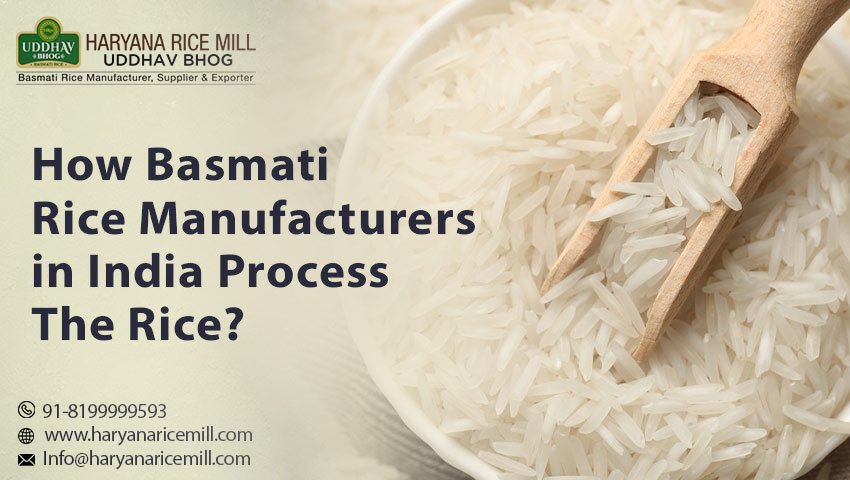Call us on
+91-8199999593
How Basmati Rice Manufacturers in India Process The Rice?
"Basmati — a word that justify the meaning of Indian heritage and tells the taste of timeless tradition. "
What most people don’t know is India, the land of diversity, is world’s largest producer of one of the most loved grains worldwide which is Basmati Rice. The wonder of Basmati is not just the long grains and the aromatic fragrance but also the long process which makes every grain a hallmark of Indian cooking.
In this blog, we will get to know about how Basmati Rice Manufacturers in India process basmati rice, starting from its unique golden grain to paddy fields.
Let’s have a look at the process of making basmati rice from field to you dinning plate.
Process Of Making Of The Basmati Rice
1. The Beginning: Growing the Royal Grain: The basmati seed deserves careful attention because, like any other seed, these also needs proper care.
Basmati rice is mainly grown in the fertile regions of Punjab, Haryana, Himachal Pradesh, Uttarakhand, and portions of Western UP because of its agri-climatic requirements.
Key Focus Areas:
- Selection of the best and hybrid varities
- Cultivation is done organically or chemicals free.
- Timely irrigation practices
2. Then comes the harvesting: A perfectly timed harvest speaks of the utmost quality and patience, which every grain carries under its husk.”
- When the grains have aged fully, basmati rice is harvested around October-November.
- After harvesting, drying process carried out
- Right after harvesting, the moisture of the paddy needs to be reduced.
3. Drying Methods Used: the very next step is to dry out the paddy that just harvested.
- Sun drying. (Traditional and Eco-friendly)
- Mechanical drying. (Faster, controlled environment.)
- Strict control of moisture levels is quite important during the drying process to avoid fungal growth or loss of aroma.
4. De-Husking: Here comes out the first layer of the paddy
- The de-husking process of the dried paddy takes off the outer husk without crushing the inner grain, making this the first of many mechanical steps.
Fact Check: Modern husking machines are meant to keep the length and strength of Basmati grains.
5. Polishing: From Rough grain to Royal one
- The rice still has a bran layer after the husk is removed. This layer is taken off with polishing machines which gives the rice its signature white or golden texture.
- Forms of Polishing: Single polishing (Nutrient Retention) & Double/triple polishing (Export Quality)
6. Grading: After polishing every grain is then sent for grading. Grading is the process of dividing rice into groups according to:
- Length of the grain
- Purity level
- Colour
- Presence of foreign matter
7. Ageing: The Secret Behind The Aroma
"As wine gets older, its quality increases. The same goes for Basmati.”
The best Basmati rice is aged between 12 to 24 months under controlled conditions for:
- Grain elongation
- Texture refinement
- Aroma enhancement
Note: Premium basmati suppliers have to age their rice to fulfill the needs of master chefs across the globe.
8. Packaging: The next step is the packaging of the fine grained basmati rice with a promise of high-quality rice.
- Multi-layered pouches that are proof against moisture.
- Packaging that is nitrogen or vacuum flushed.
Note: Private labeling facilities are available for international markets as per the need and demand of the clients.
9. Quality Checks & Certificatons: Basmati rice's moisture level and pesticide residue is checked before the rice is sent out, furthermore tests like these ISO, HACCP and FSSAI have to be passed also.
Delivery is then get planned of Basmati rice to be exported so that they arrives on time.
Why does all these process holds great significance?
Because Basmati is more than just rice – it is India’s aromatic ambassador to the world. And Basmati Rice Manufacturers in India ensure that every grain captures its purity, heritage, and taste.

